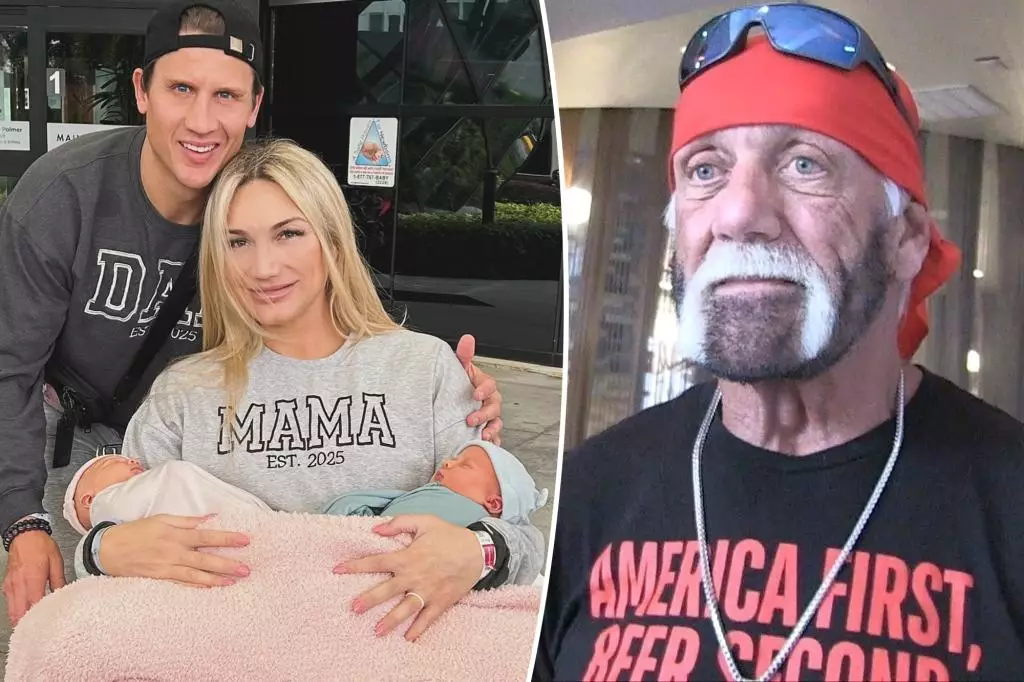The narrative surrounding Hulk Hogan’s fractured relationship with his daughter Brooke unfolds as a poignant reminder of how fame, personal battles, and unspoken grievances can distort familial bonds. Despite his legendary status in the wrestling world, Hogan’s interactions—or rather, the lack thereof—with Brooke’s children highlight a universal truth: that even the most celebrated figures grapple with their own emotional limitations and unresolved conflicts. The claim that Hogan showed “no interest” in meeting his grandchildren underscores a deeper, perhaps more tragic, aspect of human vulnerability—the difficulty of bridging emotional gaps when communication becomes a battleground for past pain or misunderstanding.
This disconnect also reveals how the veneer of stardom often obscures feelings of remorse, guilt, or regret. Hogan’s apparent detachment wasn’t born overnight but seems to have been shaped by years of private struggles and public scrutiny. His indifference, as cold as it appears on the surface, invites speculation about his inner torment—was it remorse masked by pride, fear of confrontation, or simply an inability to reconcile with what was lost? Such complexities challenge the simplistic narrative of estrangement, urging us to see behind the curtain of fame to the raw human emotions tangled within.
The Fabric of Memory and the Nature of Forgiveness
Brooke’s candid reflections shed light on her own journey toward understanding her father’s silence. Her assertion that they “never fought” suggests a relationship marred more by silence than by conflict—a subtle, ongoing disappointment etched into quiet moments and private exchanges. Her decision to move closer to Hogan, only to face rejection amidst his health battles, underscores the painful paradox of seeking closeness when it’s met with emotional withdrawal. It exposes a distressing reality: that love and familial bonds do not always convey themselves in reciprocated gestures, especially when compounded by aging parents’ health issues and emotional pain.
The narrative also hints at a generational and emotional divide: Hogan’s retreat into private suffering contrasts sharply with Brooke’s desire for connection. Her act of stepping back from her father’s estate further illustrates her internal struggle with trust, dignity, and the lingering scars inflicted by years of estrangement. This act of self-preservation highlights an uncomfortable truth—sometimes, protecting oneself from further emotional harm entails relinquishing material ties that symbolize familial bonds. The complex dance between forgiveness and self-care plays out in this delicate context, revealing that healing is a multifaceted process often marred by lingering doubts and unresolved grievances.
The Cost of Fame: Legacy, Betrayal, and the Power of Public Memory
Hulk Hogan’s legacy extends far beyond his wrestling persona. His deep involvement in high-profile legal battles—most notably against Gawker over the leak of his sex tape—shaped public perception of his character and added layers of controversy. The leaked audio, where Hogan allegedly uttered racial slurs, transformed his reputation from wrestling icon to a figure ensnared in accusations of prejudice and insensitivity. Despite the substantial settlement, the wounds inflicted—both personal and public—shed light on how fame often complicates the narrative, tethering a person’s identity to their worst mistakes.
The decision of Brooke to disengage from her father’s estate further complicates the legacy debate. She seemingly prioritized her own moral compass and emotional integrity over material inheritance—an act that some interpret as a stand against her father’s past actions. Her husband’s assertion that her choice was motivated by safeguarding her father’s “best interests” suggests a nuanced perspective: that familial legacy is often intertwined with personal ethics. This raises broader questions about how we reconcile admiration for a public figure’s achievements with their private shortcomings. The tension between honoring legacy and confronting uncomfortable truths creates a complicated mosaic of identity, morality, and family loyalty.
Lessons Beyond the Spotlight
The tragic story of Hulk Hogan and Brooke Hogan encapsulates universal lessons about the profound impact of unresolved conflicts, the importance of emotional honesty, and the human cost of fame. Their story challenges us to consider how we manage our relationships with those closest to us—acknowledging that behind public success often lie unspoken wounds that never fully heal. The silence that defined their relationship reminds us that sometimes, words left unsaid and opportunities missed can leave scars more enduring than any physical injury.
This saga also underscores the importance of empathy and humility in family dynamics. The pain experienced by Brooke and her father prompts reflection on how personal struggles—be it health issues, emotional baggage, or past grievances—can blind even the most resilient individuals from seeing the humanity in each other. While the public narrative may focus on betrayal, lawsuits, or inheritance disputes, beneath it all lies a shared longing for connection, understanding, and peace—a longing that remains painfully unfulfilled in their story.
Their experience serves as a stark reminder that no matter how glorious life seems on the outside, behind every story are complex, flawed human beings trying to navigate their own emotional landscapes. Healing, if it is to happen, demands vulnerability, forgiveness, and sometimes accepting that certain gaps may never be bridged. Ultimately, their story is a testament to the fragile nature of family ties and the enduring human desire for reconciliation, no matter how distant the past may seem.

Leave a Reply